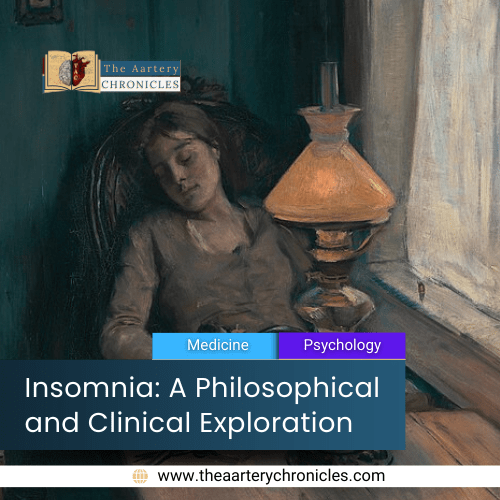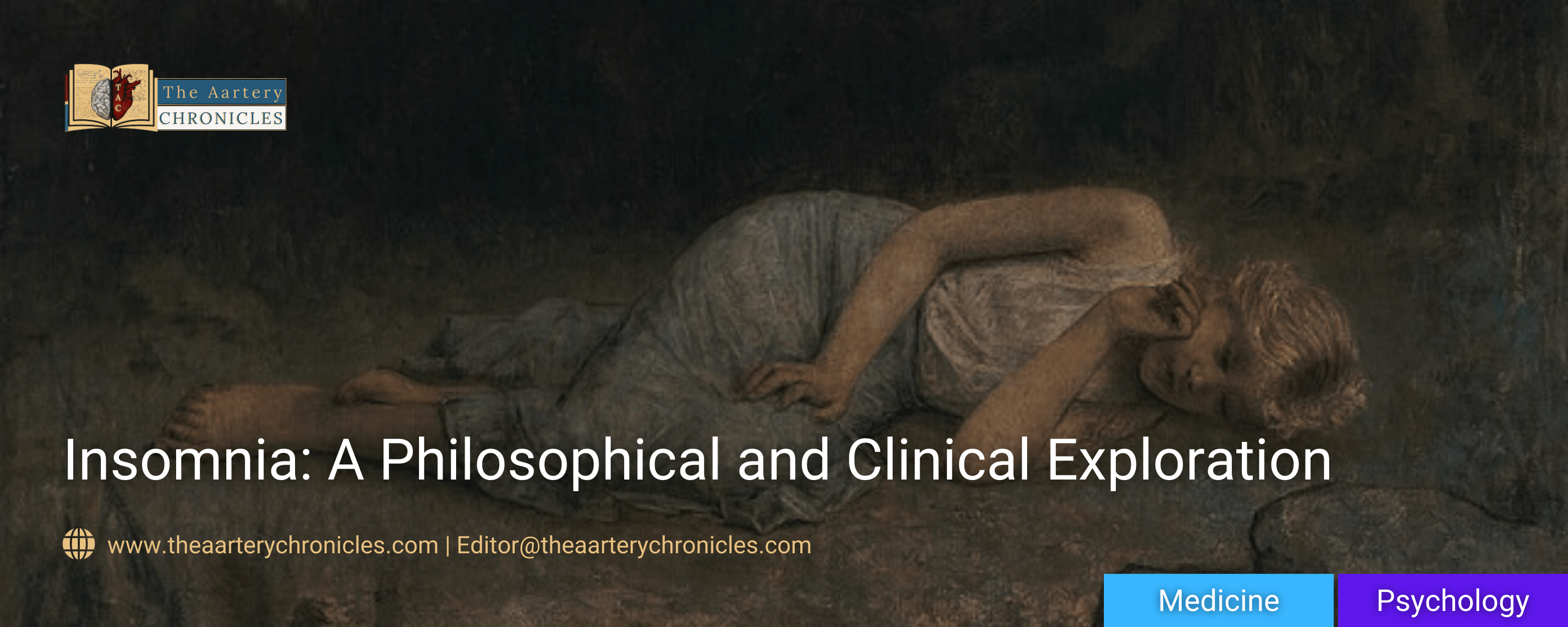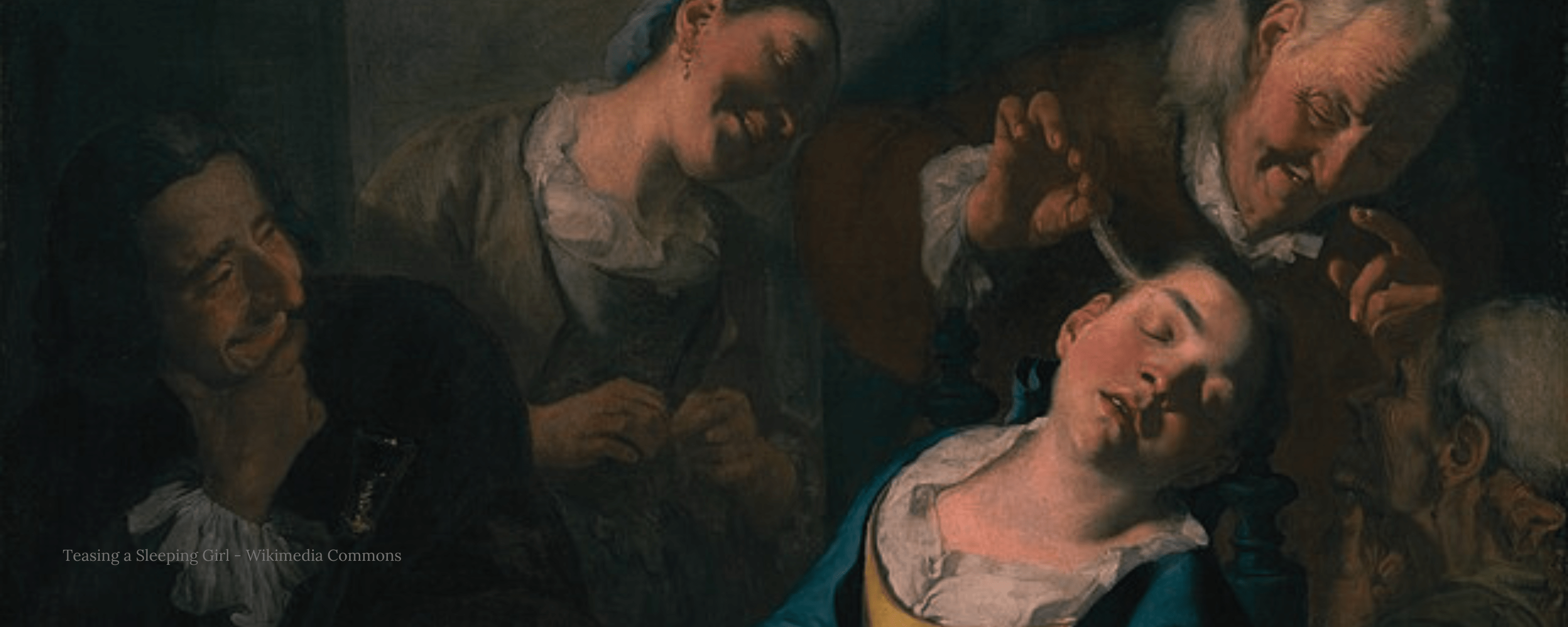

Insomnia: A Philosophical and Clinical Exploration
In one of my articles “Hypnophobia: An Excerpt About Fear and Sleeplessness” we delved into the notion that sometimes it feels more prudent to remain awake and vigilant, rather than succumb to the vulnerability of sleep. We discussed how the fear of losing control, with the world crumbling and important matters slipping through our fingers, can often be the culprit behind our sleepless nights. Building upon this exploration, I find it beneficial to dissect the topic into two distinct realms: the philosophical and the clinical.
This bi-faceted approach seems fitting as our thoughts and experiences throughout life significantly influence our actions and, consequently, their consequences. Much like how the ingestion of stale grain contaminated with ergot fungi can result in the severe condition known as St. Anthony’s Fire, or Ergotism, as explored in a previous article (Ergot Poisoning and Ergotism: The Mystery of St. Anthony’s Fire) on TAC, our minds burdened with unnecessary stressors can profoundly disrupt our sleep patterns, potentially leading to debilitating conditions such as insomnia.

The Philosophical Perspective
The Human Mind:
The human mind is a vast repository filled with a cocktail of sins, regrets, fears, desires, pleasures and pain. Some People are sometimes willing to sacrifice years of hard work and success for a fleeting moment of pleasure or peace, while some are so caught up with their demons that they are incapable of moving ahead.
Coping with Adversities:
While various techniques exist to cope with adversity such as positive thinking, meditation, hard work, and therapy, perhaps the simplest and most practical approach is to acknowledge that others may be facing even greater challenges. Taking a moment to reflect on how much worse things could be can provide valuable perspective. This may sound a bit pessimistic but, trust me sometimes you need to understand the negatives before you become eligible enough to handle the intense positive.
Solitude and Self-reflection:
Do people truly understand our feelings? Often, the answer is no. Sometimes, all you need is solitude to assess the intricacies of your circumstances and contemplate what went wrong. Just like how an engine requires time to cool down, our mind or rather our body also needs the so-called “break” or sleep to reset the internal mechanism that keeps us going. This sleep, no wonder how important or peaceful it may sound, is one of the most misunderstood or craved aspects in many of our lives.
Sleep and Insomnia:
Getting a good night’s sleep is often very conditional and only a few of us can achieve it. There are multiple reasons as to why an individual loses sleep and eventually slips into Insomnia. Sleep, often cherished as a respite, can become elusive when the fear of losing control grips you. This fear isn’t rooted in pleasure or pain but in past experiences and observations. Through practice, dedication, discipline and acceptance one can overcome this condition as many battles can be won by making peace with oneself, and by striving to understand and accept who you are. Success comes from internal acceptance and self-awareness.
Insomnia and sleep disorders have become the starting topics, with all the flooding of knowledge we must be self-aware, do our own research and approach experts who can guide us through our issues.
The Human Mind:
The human mind is a vast repository filled with a cocktail of sins, regrets, fears, desires, pleasures and pain. Some People are sometimes willing to sacrifice years of hard work and success for a fleeting moment of pleasure or peace, while some are so caught up with their demons that they are incapable of moving ahead.
Coping with Adversities:
While various techniques exist to cope with adversity such as positive thinking, meditation, hard work, and therapy, perhaps the simplest and most practical approach is to acknowledge that others may be facing even greater challenges. Taking a moment to reflect on how much worse things could be can provide valuable perspective. This may sound a bit pessimistic but, trust me sometimes you need to understand the negatives before you become eligible enough to handle the intense positive.
Solitude and Self-reflection:
Do people truly understand our feelings? Often, the answer is no. Sometimes, all you need is solitude to assess the intricacies of your circumstances and contemplate what went wrong. Just like how an engine requires time to cool down, our mind or rather our body also needs the so-called “break” or sleep to reset the internal mechanism that keeps us going. This sleep, no wonder how important or peaceful it may sound, is one of the most misunderstood or craved aspects in many of our lives.
Sleep and Insomnia:
Getting a good night’s sleep is often very conditional and only a few of us can achieve it. There are multiple reasons as to why an individual loses sleep and eventually slips into Insomnia. Sleep, often cherished as a respite, can become elusive when the fear of losing control grips you. This fear isn’t rooted in pleasure or pain but in past experiences and observations. Through practice, dedication, discipline and acceptance one can overcome this condition as many battles can be won by making peace with oneself, and by striving to understand and accept who you are. Success comes from internal acceptance and self-awareness.
Insomnia and sleep disorders have become the starting topics, with all the flooding of knowledge we must be self-aware, do our own research and approach experts who can guide us through our issues.

The Clinical Perspective
What is Insomnia?
Insomnia is one of the most common complaints in medical, psychiatric and general clinical practice. Insomnia is a sleep disorder characterised by difficulty falling asleep, staying asleep, or experiencing non-restorative sleep despite having the opportunity to sleep. It can be temporary or chronic and may be caused by various factors such as stress, anxiety, depression, medical conditions, medications, or lifestyle habits.
Manifestation of Insomnia:
It can manifest in various ways, including difficulty falling asleep at the beginning of the night, waking up frequently during the night, or waking up too early in the morning and being unable to fall back asleep. Insomnia can lead to daytime fatigue, irritability, difficulty concentrating, and impaired functioning in daily activities.
Salient features:
- Difficulty in initiating sleep, frequent awakenings from sleep, early morning insomnia.
- It is important to note that in the elderly, the physiological reduction in the number of hours of sleep does not mean Insomnia.
- If the patient is only distressed due to decreased sleep, the treatment is aimed to increase the duration of sleep only.
- It is important to take a thorough personal and clinical history of the patient to know the exact cause of insomnia. Pay attention to the stressors and events that have immensely affected the patient’s life. (Death, Birth, Unemployment, failure, Heartbreak, etc.)
- Duration of symptoms usually varies from a few days to many months or even years depending on the etiology.
Types of Insomnia
Insomnia can be classified into different types based on its duration and underlying causes.
Acute Insomnia:
Short-term Insomnia that often occurs in response to a specific event or circumstance, such as stress, jet lag, or a sudden change in environment. Duration: Typically lasts for a few days or weeks and resolves on its own once the triggering factor is addressed.
Chronic Insomnia:
Chronic insomnia is a long-term sleep disorder that persists for at least three nights a week for three months or more. It can be caused by a variety of factors, including medical conditions, psychiatric disorders, medications, substance abuse, or lifestyle choices.
Onset Insomnia:
Onset insomnia refers to difficulty falling asleep at the beginning of the night. Individuals usually toss and turn in bed for an extended period before finally falling asleep.
Maintenance Insomnia:
Maintenance insomnia involves difficulty staying asleep throughout the night, with frequent awakenings or waking up too early and being unable to fall back asleep. Leads to fragmented sleep and fatigue during the day.
Comorbid Insomnia:
Comorbid insomnia occurs alongside other medical or psychiatric conditions, such as depression, anxiety, chronic pain, or sleep disorders like sleep apnea.
Behavioural Insomnia of Childhood:
This type of insomnia primarily affects infants, toddlers, and young children and is often related to bedtime resistance, difficulty settling down to sleep, or nighttime awakenings. It can result from inconsistent bedtime routines, excessive stimulation before bedtime, or parental responses to sleep disturbances.
Treatment:
Treatment for insomnia often involves addressing underlying causes and adopting healthy sleep hygiene practices.
- Setting a consistent schedule: Go to bed at a set time each night and try to get up at the same time. It is crucial to avoid daytime naps.
- Avoid having large meals before bed. Eat at regular times daily. Avoid taking stimulants, medications or food beverages in the evening hours. (Caffeine, alcohol, nicotine, etc.)
- Do mild-moderate physical exercise in the morning
- Relax before going to bed: A warm bath, reading, writing, or other relaxing routine can help you fall asleep. Avoid using Mobile phones, and tablets, instead substitute them with books or meditations. Substitute television or Netflix with radio.
- Do not just lie in bed awake. If you do not fall asleep after being in bed for 20 minutes, do something else like reading a book, watching a documentary, or listening to music, until you feel tired. Avoid chatting or texting!
- Practise evening relaxation methods such as progressive muscular relaxations or meditations.
- Maintain comfortable sleeping conditions: Keep the room dark and well-ventilated. Wear light clothes, preferably cotton, less is better. Avoid tight-fitting clothes. Avoid drinking excessive amounts of water before bed.
Zolpidem, Lorazepam or Clonazepam are usually prescribed to patients with Insomnia. zolpidem and lorazepam both exert their effects on the GABA neurotransmitter system in the brain but through different pharmacological mechanisms. Zolpidem is a nonbenzodiazepine sedative-hypnotic medication, while lorazepam is a benzodiazepine with sedative and anxiolytic properties.
Zolpidem
Mechanism of Action: Zolpidem is a sedative-hypnotic medication that belongs to the class of drugs known as nonbenzodiazepines or "Z-drugs." It acts primarily on the gamma-aminobutyric acid (GABA) neurotransmitter system in the brain. Zolpidem enhances GABA's activity, an inhibitory neurotransmitter that helps regulate neuronal excitability. By binding to specific GABA-A receptors in the brain, zolpidem enhances the inhibitory effects of GABA, resulting in sedative, hypnotic, and anxiolytic (anxiety-reducing) effects. This mechanism promotes sleep initiation and maintenance.
Lorazepam
Mechanism of Action: Lorazepam belongs to the benzodiazepine class of drugs, which also act on the GABA neurotransmitter system. Like zolpidem, lorazepam enhances the activity of GABA by binding to specific GABA-A receptors in the brain. However, lorazepam has a broader spectrum of effects compared to zolpidem, including anxiolytic, sedative, muscle relaxant, and anticonvulsant properties. In the context of insomnia treatment, lorazepam may be prescribed for its sedative effects to promote sleep onset and maintenance. However, due to the potential for tolerance, dependence, and withdrawal symptoms associated with benzodiazepines, including lorazepam, they are typically reserved for short-term use and may not be recommended as a first-line treatment for chronic insomnia.
Conclusion:
In conclusion, insomnia is a common sleep disorder with various manifestations and causes. Effective management involves adopting healthy sleep habits, addressing underlying stressors, and seeking professional guidance when needed. While medications like zolpidem and lorazepam can provide short-term relief, they should be used cautiously due to potential side effects. By taking a comprehensive approach to insomnia, individuals can improve sleep quality and overall well-being.
- Sadock BJ, Sadock VA, Ruiz P. Kaplan and Sadock's Synopsis of Psychiatry, 11th Edition, Wolters Kluwer Philadelphia 2015; pp 542-544.
- Taylor D, Paton C, Kapur S. The Maudsley Prescribing Guidelines, 12th Edition. Wiley-Blackwell, West Sussex 2015; pp 343-352.
- Hypnophobia - The fear that keeps You Awake
- Ergot Poisoning and Ergotism: The Mystery of St. Anthony's Fire
Hypnophobia: An Excerpt About Fear and Sleeplessness





